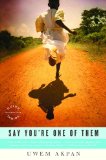Summary | Excerpt | Reading Guide | Reviews | Beyond the Book | Readalikes | Genres & Themes | Author Bio

Mama tried to discourage him from tying down the trunk. "Bwanaaa . . . stop it! She will leave if she finds you mangamangaring with her things."
"Woman, leave this business to me," he said, rebuking her. "I'm not going to sit here and let any Honolulus run away with our daughter. They must marry her properly."
"You should talk," Mama said. "Did you come to my father's house for my hand?"
"Nobody pays for trouble," Baba said. "You're trouble. If I just touch you, you get pregnant. If I even look at you — twins, just like that. Too, too ripe."
"Me am always the problem," Mama said, her voice rising.
"All me am saying is we must to treat the tourist well."
Atieno was shivering; her hand was poking out of the shack. Baba yanked it back in and stuck her head through the biggest hole in the middle of our blanket. That was our way of ensuring that the family member who most needed warmth maintained his place in the center of the blanket. Baba grabbed Otieno's legs and pushed them through two holes on the fringe. "Children of Jaguar," he whispered into their ears. "Ex-mas ya Jag- uar." He tried to tuck Atieno and Otieno properly into the blanket, turning them this way and that, without success. Then he became impatient and rolled them toward each other like a badly wrapped meat roll, their feet in each other's face, their knees folded and tucked into each other's body—a blanket womb.
Mama reminded him to wedge the door, but he refused. He wanted us to wait for Maisha. He winked at me as if I were the cosentry of our fortune. Mama handed Baby to me and lay down. I sat there sniffing kabire until I became drunk. My head swelled, and the roof relaxed and shook, then melted into the sky.
I was floating. My bones were inflammable. My thoughts went out like electric currents into the night, their countercurrents running into each other, and, in a flash of sparks, I was hanging on the door of the city bus, going to school. I hid my uniform in my bag so that I could ride free, like other street children. Numbers and letters of the alphabet jumped at me, scurrying across the page as if they had something to say. The flares came faster and faster, blackboards burned brighter and brighter. In the beams of sunlight leaking through the holes in the school roof, I saw the teacher writing around the cracks and patches on the blackboard like a skillful matatu driver threading his way through our pothole- ridden roads. Then I raced down our bald, lopsided field with an orange for a rugby ball, jumping the gullies and breaking tackles. I was already the oldest kid in my class.
Mama touched my shoulders and relieved me of the infant. She stripped Baby of the plastic rompers, cleaned him up, and put him in a nappy for the night. With a cushion wrested from Naema, who was sleeping, Mama padded the top of the carton into a cot. After placing Baby in it, she straightened the four corners of the carton and then folded up our mosquito net and hung it over them. It had been donated by an NGO, and Baba had not had a chance to pawn it yet. Then Mama wrapped her frame around the carton and slept.
I woke up Baba when Maisha returned, before dawn. He had been stroking his rosary beads, dozing and tilting until his head upset the mosquito netting. Mama had to continually elbow or kick him off. And each time, he opened his eyes with a practiced smile, thinking the Jaguar hour had arrived. The rain had stopped, but clouds kept the night dark. The city had gorged itself on the floods, and its skin had swelled and burst in places. The makeshift tables and stalls of street markets littered the landscape, torn and broken, as if there had been a bar fight. Garbage had spread all over the road: dried fish, stationery, trinkets, wilted green vegetables, plastic plates, wood carvings, underwear. Without the usual press of people, the ill- lit streets sounded hollow, amplifying the smallest of sounds. Long after a police car had passed, it could be heard negotiating potholes, the officers extorting their bribes—their Ex- mas kitu kidogo—from the people who could not afford to go to their up- country villages for the holidays.
Copyright © 2008 by Uwem Akpan
Your guide toexceptional books
BookBrowse seeks out and recommends the best in contemporary fiction and nonfiction—books that not only engage and entertain but also deepen our understanding of ourselves and the world around us.